القائمة الرئيسية

Saudi Arabia Unable to Fulfill Oil Pledge
الثلاثاء, 24 كانون الثاني 2012 الساعة 13:35 | , Business
 Jouhina news,
Analysts believe that Saudi Arabia cannot live up to its promise to fill the oil-supply gap in case the US-led European Union imposes a ban on Iranian oil supplies.
Analysts said failure could put further price pressure on markets already roiled by tensions linked to efforts to curb Tehran's peaceful nuclear program.
There are encouraging signs that the West is re-examining the prospects for a diplomatic solution. But that does not mean the European Union is likely to drop proposed measures to ban Iranian oil imports from mid-year that are due to be discussed by its foreign ministers on Monday.
Iran fired back this week after Ali al-Naimi, the Saudi energy minister, said in interviews that his country could step up crude output to fill the gap if sanctions cut into Iran's 2.2 million barrels of daily oil exports.
Strategically, the Saudi pledge came between President Barack Obama signing a bill that included financial sanctions geared to deter foreign companies from doing business with the Iranian crude export sector and the EU deliberations over banning Iranian crude.
Tehran has warned that if Saudi Arabia, Iran's partners in the 12-member Organization of the Petroleum Exporting Countries, embarks on such an act, it will then prove to be part of the alliance ranged against it.
"Our Arab neighbors should not cooperate with these adventurers and should adopt prudent measures," Mohammad Ali Khatibi, Iran's OPEC representative, said. It was the latest warning to the Saudis to stay out of the dispute.
Writing in The New Republic, Kenneth Pollack notes: "The Saudis have said that they would offset any drop in Iranian oil by increasing their own, but many analysts question Riyadh's capacity to do so completely or for a sustained period of time."
Tensions over tightened sanctions against Iran, and the Islamic Republic's potential response, have kept oil above $100 a barrel for most of this month.
Analysts estimate new sanctions could cost Iran up to a fifth of its oil sales, which it can sell to Asian customers easily, but filling the gap is not just a simple matter of the Saudis turning up the tap.
"The very fact of Saudi Arabia pushing production close to its capacity would itself alarm the markets and send prices up," said Nassir Shirkhani of the energy newspaper Upstream. "The Saudis would also be using heavier oil that might not be suitable for refineries that use Iranian crude."
Shirkhani told Rendezvous he believed China would step in as a buyer to prop up Iranian exports and noted the reluctance despite US pressure on India and South Korea to get drawn into sanctions.
"Iran could turn to more barter deals," Shirkhani said, "and if the oil price went up further, Iran would benefit."
Iran, the second-biggest OPEC player after kingpin Saudi Arabia, produces about 2.3 million barrels of oil per day - 450,000 barrels of which is exported to the European Union, according to the US Department of Energy.
Manouchehr Takin, an analyst at the Center for Global Energy Studies ( CGES) research group, said a removal of Iranian oil exports would hurt Europe more than Tehran.
"The Europeans are importing nearly half a million barrels per day ... Refineries in Greece, Italy and Spain are the main customers. They would suffer very much immediately financial loss (in event of sanctions) because they cannot easily replace that Iranian crude with other crude," he told AFP in December.
"Financially, I think these refineries in Europe - specially those three countries that are having financial problems - would lose and suffer more than Iran would lose in finding other customers," Takin added.
Commerzbank analyst Eugen Weinberg agreed that sanctions would most affect the three eurozone nations which are in the grip of severe debt problems.
Weinberg wrote in a research note "it remains to be seen whether this step (EU sanctions on Iranian oil supplies) is actually taken" as it would strike a heavy blow to the EU members.
"After all, crisis-ridden Italy, Spain and Greece rely on oil from Iran; an embargo would force them to source their oil requirements elsewhere at considerably higher prices."
(Fna)
Jouhina news,
Analysts believe that Saudi Arabia cannot live up to its promise to fill the oil-supply gap in case the US-led European Union imposes a ban on Iranian oil supplies.
Analysts said failure could put further price pressure on markets already roiled by tensions linked to efforts to curb Tehran's peaceful nuclear program.
There are encouraging signs that the West is re-examining the prospects for a diplomatic solution. But that does not mean the European Union is likely to drop proposed measures to ban Iranian oil imports from mid-year that are due to be discussed by its foreign ministers on Monday.
Iran fired back this week after Ali al-Naimi, the Saudi energy minister, said in interviews that his country could step up crude output to fill the gap if sanctions cut into Iran's 2.2 million barrels of daily oil exports.
Strategically, the Saudi pledge came between President Barack Obama signing a bill that included financial sanctions geared to deter foreign companies from doing business with the Iranian crude export sector and the EU deliberations over banning Iranian crude.
Tehran has warned that if Saudi Arabia, Iran's partners in the 12-member Organization of the Petroleum Exporting Countries, embarks on such an act, it will then prove to be part of the alliance ranged against it.
"Our Arab neighbors should not cooperate with these adventurers and should adopt prudent measures," Mohammad Ali Khatibi, Iran's OPEC representative, said. It was the latest warning to the Saudis to stay out of the dispute.
Writing in The New Republic, Kenneth Pollack notes: "The Saudis have said that they would offset any drop in Iranian oil by increasing their own, but many analysts question Riyadh's capacity to do so completely or for a sustained period of time."
Tensions over tightened sanctions against Iran, and the Islamic Republic's potential response, have kept oil above $100 a barrel for most of this month.
Analysts estimate new sanctions could cost Iran up to a fifth of its oil sales, which it can sell to Asian customers easily, but filling the gap is not just a simple matter of the Saudis turning up the tap.
"The very fact of Saudi Arabia pushing production close to its capacity would itself alarm the markets and send prices up," said Nassir Shirkhani of the energy newspaper Upstream. "The Saudis would also be using heavier oil that might not be suitable for refineries that use Iranian crude."
Shirkhani told Rendezvous he believed China would step in as a buyer to prop up Iranian exports and noted the reluctance despite US pressure on India and South Korea to get drawn into sanctions.
"Iran could turn to more barter deals," Shirkhani said, "and if the oil price went up further, Iran would benefit."
Iran, the second-biggest OPEC player after kingpin Saudi Arabia, produces about 2.3 million barrels of oil per day - 450,000 barrels of which is exported to the European Union, according to the US Department of Energy.
Manouchehr Takin, an analyst at the Center for Global Energy Studies ( CGES) research group, said a removal of Iranian oil exports would hurt Europe more than Tehran.
"The Europeans are importing nearly half a million barrels per day ... Refineries in Greece, Italy and Spain are the main customers. They would suffer very much immediately financial loss (in event of sanctions) because they cannot easily replace that Iranian crude with other crude," he told AFP in December.
"Financially, I think these refineries in Europe - specially those three countries that are having financial problems - would lose and suffer more than Iran would lose in finding other customers," Takin added.
Commerzbank analyst Eugen Weinberg agreed that sanctions would most affect the three eurozone nations which are in the grip of severe debt problems.
Weinberg wrote in a research note "it remains to be seen whether this step (EU sanctions on Iranian oil supplies) is actually taken" as it would strike a heavy blow to the EU members.
"After all, crisis-ridden Italy, Spain and Greece rely on oil from Iran; an embargo would force them to source their oil requirements elsewhere at considerably higher prices."
(Fna)
اقرأ المزيد...

 Economic Media Expo kicks off in Damascus
Economic Media Expo kicks off in Damascus  Cabinet addresses issue of terrorists dismantling factories and properties in Idleb and smuggling them to Turkey
Cabinet addresses issue of terrorists dismantling factories and properties in Idleb and smuggling them to Turkey  Syrian Businessmen gearing up to open commercial centers abroad
Syrian Businessmen gearing up to open commercial centers abroad 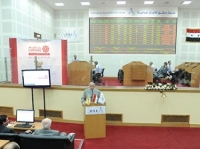 DSE session closes at 1195.73 points
DSE session closes at 1195.73 points 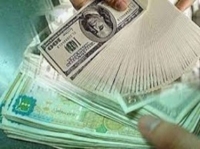 Monday USD exchange rate against SYP 246.16
Monday USD exchange rate against SYP 246.16  Thursday USD exchange rate against SYP 241.23
Thursday USD exchange rate against SYP 241.23  Cabinet sets price for purchasing wheat and barley from farmers
Cabinet sets price for purchasing wheat and barley from farmers  Monday’s USD exchange rate against SYP 260.71
Monday’s USD exchange rate against SYP 260.71 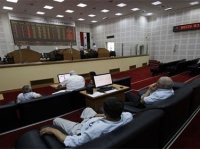 DSE closes at 1205.95 points
DSE closes at 1205.95 points 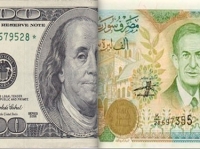 USD exchange rate against SYP set at 251.75
USD exchange rate against SYP set at 251.75 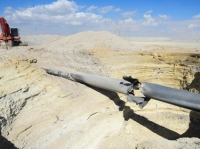 Ministry of Electricity: Terrorist attack targets gas pipline
Ministry of Electricity: Terrorist attack targets gas pipline  DSE session closes at 1238.17 points
DSE session closes at 1238.17 points 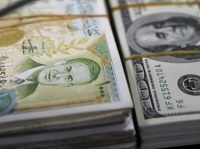 CBS injects USD 5 million out of the 65 millions planned for sale in market
CBS injects USD 5 million out of the 65 millions planned for sale in market  Homs Governor: Electric power production in province expanding
Homs Governor: Electric power production in province expanding  The new SYP 500 banknotes released
The new SYP 500 banknotes released  روسيا تطلق 4 أقمار "غريفون" صناعية إلى المدار لتصوير الأرض بتقنية الرصد البصري
روسيا تطلق 4 أقمار "غريفون" صناعية إلى المدار لتصوير الأرض بتقنية الرصد البصري
 نعيم قاسم: نزع السلاح مشروع إسرائيلي أمريكي لزرع الفتنة ولبنان اليوم في قلب العاصفة
نعيم قاسم: نزع السلاح مشروع إسرائيلي أمريكي لزرع الفتنة ولبنان اليوم في قلب العاصفة
 قوات الاحتلال الإسرائيلي تعتقل 5 شبان من درعا
قوات الاحتلال الإسرائيلي تعتقل 5 شبان من درعا
 ميلان يهزم فيرونا بثلاثية نظيفة ويصعد لصدارة الدوري الإيطالي
ميلان يهزم فيرونا بثلاثية نظيفة ويصعد لصدارة الدوري الإيطالي
 من هي مجموعة "سرايا أنصار السنة" منفذة هجوم حمص؟
من هي مجموعة "سرايا أنصار السنة" منفذة هجوم حمص؟
 الشيخ غزال يدعو إلى مظاهرات في عموم المناطق العلوية للمطالبة بالفدرالية وحق تقرير المصير
الشيخ غزال يدعو إلى مظاهرات في عموم المناطق العلوية للمطالبة بالفدرالية وحق تقرير المصير
 وزير المالية السوري يدعو للتقيد بتعليمات المركزي بشأن استبدال العملة وعدم الالتفات للشائعات
وزير المالية السوري يدعو للتقيد بتعليمات المركزي بشأن استبدال العملة وعدم الالتفات للشائعات
 رحيل فيلسوف السينما.. وفاة المخرج داود عبد السيد بعد صراع مع المرض
رحيل فيلسوف السينما.. وفاة المخرج داود عبد السيد بعد صراع مع المرض
